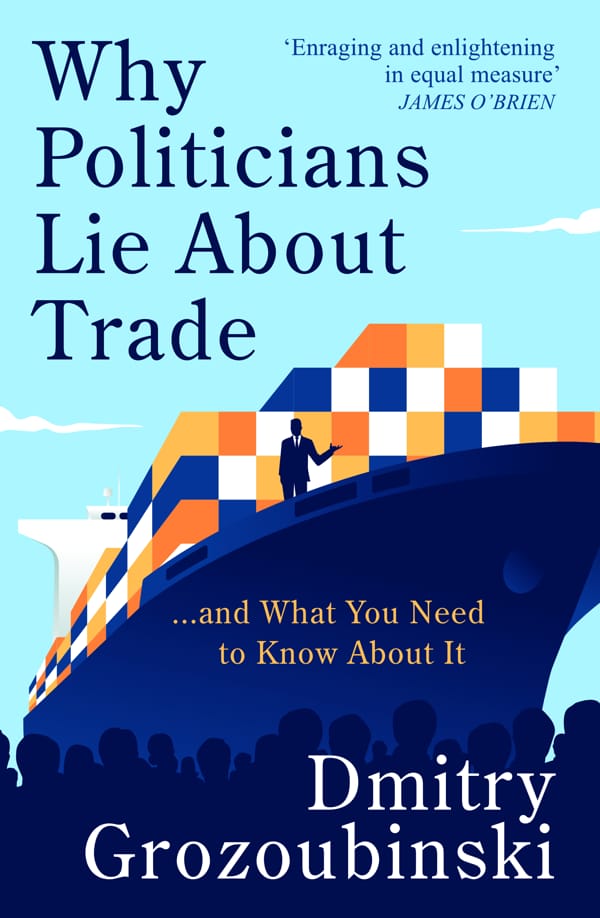Book review: Why Politicians Lie About Trade … and What You Need to Know About It, by Dmitry Grozoubinski (Canbury Press, 2024)
Trade policy tends to fly under the radar most of the time, only occasionally attracting intense interest and public attention.
One such instance in Australia was the Howard government’s decision to pursue a comprehensive free trade agreement with the United States, which set off a major debate on its pros and cons. Likewise, the United Kingdom’s decision to negotiate several free trade agreements – including with Australia – in the wake of its departure from the European Union triggered a similar, but even more ferocious outbreak of claim and counter claim on the merits or otherwise of such agreements.
In both cases, proponents and opponents often peddled selective and misleading assertions. Advocates talked of only the benefits. Opponents highlighted the threats and risks. Many stakeholders and members of the public struggled to sift fact from fiction.
Hyperbole is of course, not uncommon in public policy debates, but it is particularly difficult to deflate in trade policy where the experts available for demystifying are relatively small in number and often in government. And books on the topic are either textbooks or highly specialised.
For some time, there has been a clear gap in the market for a guide to trade policy to help those with an interest to gain a better understanding of this important field and enable them to engage more actively in trade policy debates. Dmitry Grozoubinski’s Why Politicians Lie About Trade fits the bill admirably. The author, a former officer in the Australian Mission to the World Trade Organisation (WTO), is now director of the Geneva Trade Platform think tank and well-known on social media for his wit and intelligent musings on many issues. Grozoubinski came to prominence in the UK during the Brexit debates when trade policy experts became highly sought after.

The first part of the book sketches out what trade policy is, its aims, its instruments and how things function in the real world. Chapters cover goods and services, free trade agreements and customs unions, and the WTO.
The second part of the book looks at trade policy’s relevance to, and intersection with, a range of contemporary public policy challenges, including climate change and national security. It also deals with the contentious issue of investor-state dispute settlement, which must surely rank among the most systematically misunderstood – and misconstrued – trade policy issues.
Grozoubinski describes the aim of the book as a “bullshit detector”, a tool to enable individuals to puncture embellishment, exaggeration and straight forward lies.
Much of the book’s strength lies in its language. It largely avoids technical and academic-style terminology, and the content is presented with a wry and sometimes mischievous sense of humour. This approach makes even the most arcane and obscure parts of the book engaging.
Grozoubinski remains scrupulously free of ideology. Explanations are presented in a balanced way, and arguments on both sides are given sufficient airing to enable them to be presented and sized up. Despite his background, Grozoubinski comes across as anything but an open market and global governance zealot. His description on the state of play of the WTO is realistic about the paralysis afflicting the institution. He deals with the topic of protectionism in a neutral fashion, avoiding broad-brush assertions or declarations of virtue. Overall, an impressive volume of information on complicated topics and themes is delivered efficiently and clearly.
In the interests of full disclosure, I should confess to being the senior official referred to in a story told in the book’s opening. After attending a lengthy WTO meeting, I apparently told Grozoubinski that my aim was to avoid having to explain the issue to my minister at the time. I confess to having only a dim memory of this event, but if it did indeed occur, then I take some comfort in the fact that this trivial exchange may have made a small contribution to launching the author on his path of trade communicator par excellence.
This book deserves to be read widely in Australia, a country that depends heavily for its future prosperity on securing access to international markets and ensuring well-defined and enforceable global trade rules are in place universally. At a time when the global trading system is facing many threats, all interested Australians should see this book as instrumental in informing a more sophisticated and democratic debate on future trade policy options and opportunities.

